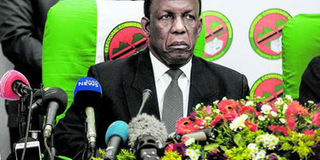Prospect of run-off in Zambia high as voting ends

The chairman of the Electoral Commission of Zambia, Esau Chulu (seated), at a press conference in Lusaka on results for three constituencies a day after election in Zambia on August 12, 2016. PHOTO | GIANLUIGI GUERCIA | AFP
What you need to know:
- Zambian election, which was supposed to involve 6.6 million voters, was a landmark and complex event.
- It also encompassed proposed changes to the Constitution.
Amid the euphoria surrounding the Olympic Games in Brazil, some significant developments took place in Africa, among them the general election in Zambia.
There are misgivings that it was tainted by violence and queries about transparency.
Nonetheless, the Thursday poll, which was supposed to involve 6.6 million voters, was a landmark and complex event that also encompassed proposed changes to the Constitution.
The main business was for Zambians to choose representatives at different levels, running the gamut from the president to the 150 MPs and local authority representatives.
Unfortunately, the results, which were expected by Friday or Saturday, were inordinately delayed, with the final certified ones expected as late as today.
The delay was occasioned by what the Electoral Commission of Zambia said was an unexpectedly large turnout.
The opposition United Party for National Development did not buy that and accused the commission of attempting to manipulate results in favour of President Edgar Lungu’s Patriotic Front party.
In Chad’s President Idriss Déby was controversially sworn in for a fifth term on Monday in a ceremony attended by 14 heads of state and government.
The 64-year-old, who is also the AU chairman, was sworn in amid protests from the opposition.
And in an unusual move, São Tomé and Príncipe President Manuel Pinto da Costa boycotted a poll run-off on Sunday alongside Parliament's Speaker Maria das Neves.
EVARISTO CARVALHO
The boycott paved the way for Evaristo Carvalho, who had won the first round vote on July 17, to become president. In the first round Costa was a distant second, followed by Neves.
In Zambia, the poll, came just 18 months after Lungu narrowly won in a snap election following the death of President Michael Sata.
Lungu garnered 48.33 per cent of the vote, beating Hakainde “HH” Hichilema who got 46.67 per cent.
During the cliffhanger February 2014 snap poll, only 27,757 votes separated the two, an ominous sign for the just-ended poll, which saw Lungu and Hichilema, 54, facing off again as the latter made his fifth bid for the top seat.
It was widely seen as a two horse-race, despite attracting nine candidates. Poignantly, the resilient Hichilema’s candidacy was considered more formidable this time.
His party has won the support of political heavyweights like former acting President Guy Scott, whose wife Charlotte was among those gunning for the Lusaka Central parliamentary seat.
Also fighting in Hichilema’s corner was former first lady Maureen Mwanawasa. She had her sights set on the Lusaka Mayor.
Yet another presidential contender was Edith Nwakakwi, who is the leader of the Forum for Democracy and Development party.
The winner is expected to secure more than 50 per cent of the vote during the first round.
That scenario is unlikely. Under the new system a re-run for will be held in 37 days.
The situation is different, however, regarding the election of MPs, mayors and councillors, as candidates who garner the largest number of votes will be declared winners.





